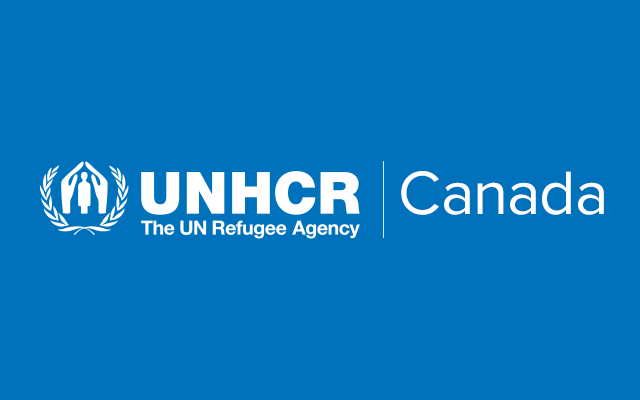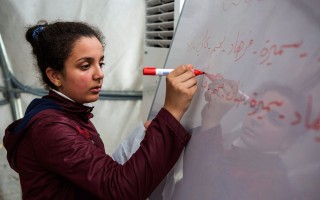Many German businesses are striving to break down employment barriers for newcomers, integrating them into the German job market with internships and vocational training.
The task is significant. Germany’s Federal Labour Office says it advised 322,000 asylum-seekers and refugees looking for work in July alone. Many struggle with the language and missing paperwork and others find they must re-train and embark on a new career.
For the determined, opportunities are there. Newcomers training with some of Germany’s top firms say landing a job means more than just a pay packet. Work means integration, acceptance, recognition and self-confidence.
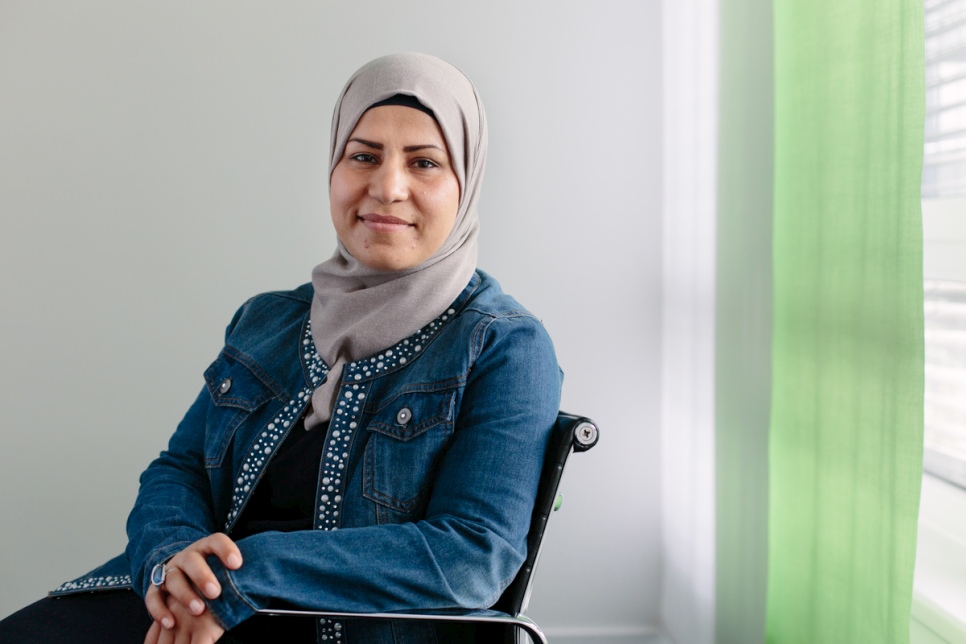
Just over a year after arriving in Germany, Syrian refugee Sana Dawod, 30, has secured a job as a software engineer at SAP. © UNHCR/Aubrey Wade
Sana Dawod, software developer at SAP
Just a year after arriving in Germany, Syrian programmer Sana Dawod is working full-time at SAP, a multinational firm that develops software for businesses.
“I never imagined I’d get a chance with a company like SAP so soon. It’s better than anything I expected,” said Sana, 30, who fled her home in the Damascus suburb of Daraya, a flashpoint in the conflict.
After gaining a degree in IT engineering, Sana worked for four years as a web developer and illustrator for a children’s NGO in the Syrian capital. When war broke out, she braved the chaos and violence and kept working.
“We struggled on for years in Syria, stayed in the hope that things would get better,” she said.
Sana’s male relatives fled to Europe after her brother was killed. She and a sister hung on in Damascus for two more years, waiting for news of a missing relative.
“It was a horrible time in Syria. In the end we lost all hope.”
When the rumours of his death came, they had nothing left to stay for. “It was a horrible time in Syria,” she said. “In the end we lost all hope. When we came here it felt like leaving our relatives who were killed behind.”
In April 2015, Sana joined relatives in Ludwigshafen, in south-west Germany, and started looking for work. She spotted a posting on social media looking for refugee interns at SAP’s headquarters nearby. Sana applied immediately and was accepted.
In January, she started as one of 80 refugees and asylum-seekers on a six-month paid internship with SAP.
Many applicants did not have certificates to prove their qualifications, so recruiters talked to them to assess their skills and experience. For Sana, there was a lot to take in.
“Everything was new – new company, new culture, new colleagues, new language, new technologies,” she said. “My previous experience helped, but there was a lot to learn about the most modern technologies.”
It was not only new code that Sana was learning. Suddenly she was in a German workplace, surrounded by an international team. “Working here helps a lot with integration,” said Sana, who attended a German language and integration course alongside her internship.
“There’s always a chance to reach out to colleagues and learn about different cultures.”
Her mentor, Rene Laengert, was impressed with her progress, and when an opening arose in his team he encouraged Sana to apply. “She’s really done well at picking up the technologies we use,” he said. “This artistic flair with the technical background – that’s a super combination.”
Earlier this month, Sana started on a full-time contract. She said landing the job was a key step in putting her new life on track. “Working here has really helped me to think positively,” she said. “Before the war, we had good lives so it’s strange to be labelled as a refugee and rely on others. I hope to stand on my own two feet as soon as possible.”
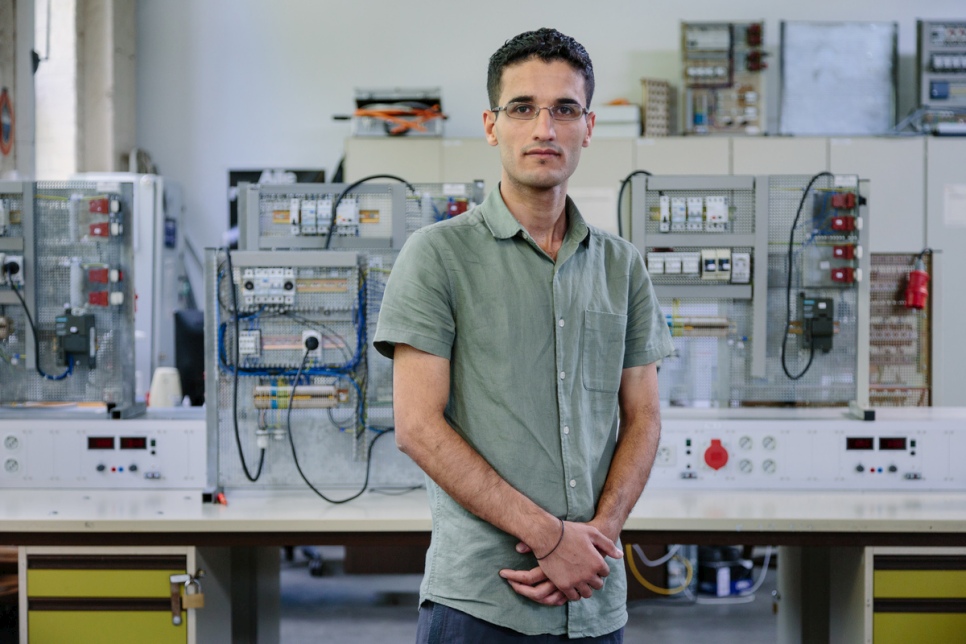
Mahmoud Nouri Al Abdulah, 26, used to work for Syria’s national rail operator. Since March 2016 he’s been training to become an electronics technician with the German equivalent, Deutsche Bahn. © UNHCR/Aubrey Wade
Mahmoud Nouri Al Abdulah, trainee at Deutsche Bahn
Last autumn, as a newcomer from Syria, Mahmoud Nouri Al Abdulah was looking for help. After nine months in Germany, the former rail electrician spoke only a few words of German and was still living in a temporary shelter in Berlin. He was anxious to move on with his new life.
“I needed help,” said Mahmoud, 26. “I wanted to work or to study, but I didn’t know how.”
He left his job with Syrian Railways in Aleppo when war broke out. “There were people trying to make me fight, so I had to leave.” He set off alone on foot for Turkey and on to Greece, picking up work along the way.
Mahmoud recalls once meeting German signalling engineers in Aleppo. “The technology they used was newer. It was fascinating.” However, in Berlin, he was lost. Unoccupied, he was often consumed with worry about his family still in Syria. “It’s so difficult for them in Aleppo. Sometimes I don’t hear from them for weeks, it’s very scary.
“When I first got here I spent months just walking around. It’s hard without help.”
“I started looking for work for him. I was pleased to hear German industry was open to hiring refugees.”
Then, a chance meeting changed everything. At a gathering of newcomers and volunteers, Mahmoud met retired social worker Gabriele Frister, who set about helping him get his life back on track. Within months, he landed a traineeship with the German rail operator Deutsche Bahn.
“First of all I found out what training Mahmoud had done in Aleppo, what he wanted, his expectations,” said Gabriele, adding that she quickly saw Mahmoud was reliable and focused. “I started looking for work for him. I was pleased to hear German industry was open to hiring refugees.”
In March, Mahmoud joined a group of 12 newcomers training with Deutsche Bahn in Berlin. The program was launched last year in conjunction with Germany’s Federal Labour Office. Further projects are planned in Munich, Hamburg, Erfurt and Bremen offering 120 vocational training places for refugees by the end of the year.
Mahmoud is nearing the end of his initial internship, which combines intensive German lessons with hands-on practical experience. From September, he will begin a three-year traineeship as an electronics technician. Afterwards he is likely to be offered a permanent position.
“It’s an amazing chance to learn about this newer technology,” he said. “I’ve been getting a lot of experience here.”
Mahmoud has moved out of his shared room in the shelter into his own apartment. He now cycles to work in the morning and is relieved finally to have space to concentrate. “I need time, but now I can learn much better, in peace.”
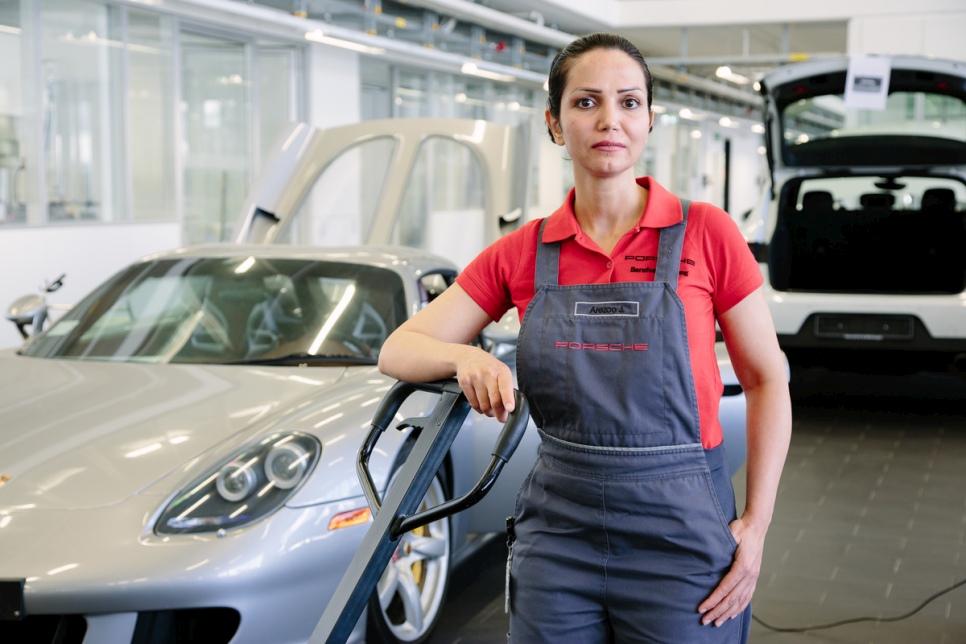
“All German people dream of working at Porsche, and I got the chance,” says Iranian refugee Arezoo Jalali, who arrived in Germany in 2011 with her young son. © UNHCR/Aubrey Wade
Arezoo Jalali, intern at Porsche
Arezoo Jalali, a refugee from Iran, struggled hard for the chance of a new life. Her difficult journey now behind her, the former lawyer is starting again, gaining new experience with German car manufacturer Porsche.
“It’s not easy leaving your home,” said Arezoo, who fled Tehran six years ago for reasons of personal security. “Perhaps people think we come here because it’s easy. I want to say it isn’t easy; it’s very painful. No refugees want to leave their homes – they have to.”
Arezoo and her son Shayan, then age 4, reached Kenya, from where they tried to fly to Germany. They were detained and sent back home. Finally, in desperation, Arezoo and Shayan fled overland through Syria to Turkey, where they crossed to Greece on a flimsy dinghy and walked on to Germany. There, exhausted after almost a year of daily hardship and nightly terror, mother and son applied for asylum.
“Shayan and I couldn’t believe we finally had a roof over our head,” Arezoo said. They were transferred to a shelter in Stuttgart, in south-west Germany. “Sometimes, when I think about what we went through, my blood runs cold. But thank God it’s over now.”
However, without work, Arezoo could not find peace. She found it impossible to forget her traumatic experiences. So she immersed herself in volunteering, supporting the women and children in her shelter. Her project was so successful she won a local media integration prize.
“All German people dream of working at Porsche, and I got the chance.”
At the award ceremony last autumn, she was approached by a manager at Porsche, who told her his company was running a training scheme for refugees. Arezoo applied. “I said straightaway, ‘I’m looking for work’,” she said. “When I heard I’d got it, it was like a dream. All German people dream of working at Porsche, and I got the chance!”
In March, Arezoo started as one of 15 newcomers on a six-month integration program at Porsche’s headquarters outside Stuttgart. Besides intensive language training and courses on German society, the trainees receive hands-on practical experience in the departments of their choice.
At 38, Arezoo is the oldest in the group. She is taking the opportunity to learn about logistics.
“My strength is organisation,” she said. “I’m good at that. I never dreamt I’d end up working with cars. But I thought, ‘I’ve got this chance, what can I do to use it?’”
Whatever happens next, Arezoo said the experience at Porsche had helped her and her young son feel pride and confidence in their new lives. “I see my life as a map,” she said. “In some places on the map there is space for good things. Porsche is there in a beautiful place on my life’s map.”
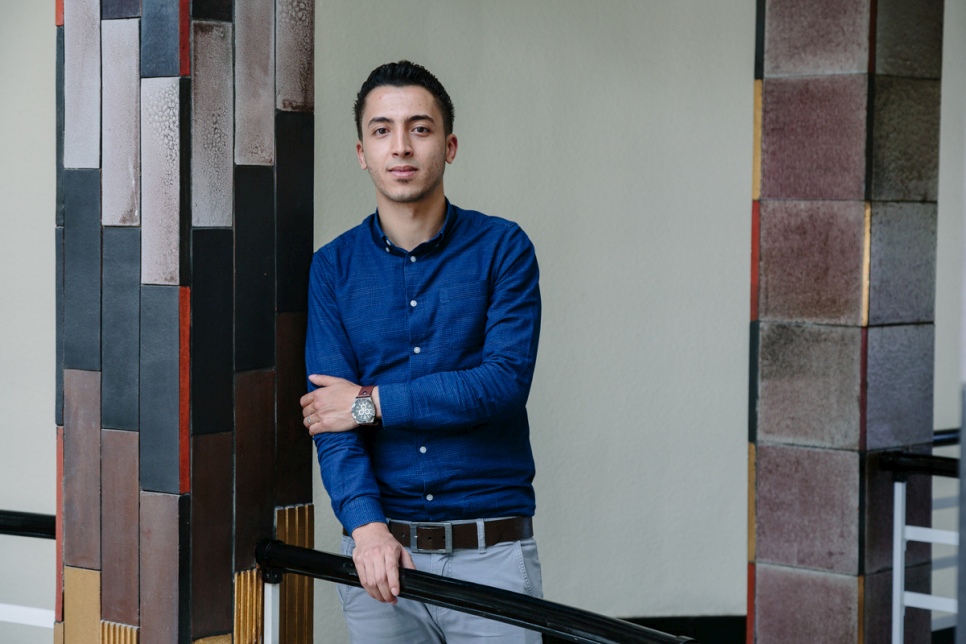
Nour Aldeen Hameed, 26, fled his home in Damascus, Syria, and will soon embark on a three-year traineeship with Deutsche Telekom. © UNHCR/Aubrey Wade
Nour Aldeen Hameed, trainee at Deutsche Telekom
Two summers ago, Nour Aldeen Hameed fled his home in Damascus for Berlin to avoid joining the war in Syria – eventually arriving in Berlin. A determined self-starter, the 26-year-old accountant has now landed a traineeship with telecommunications firm Deutsche Telekom. However, His two years in Germany have been far from easy.
“I knew I wasn’t here on holiday,” said Nour, who waited for more than a year for his asylum application to be granted. While waiting, his employment options were limited but he was intent on getting as much experience as he could. “As soon as one internship finished I looked for another,” he said.
Last summer Nour came across Workeer, a German website helping refugees apply for jobs. The organization supported him when he applied for a three-month paid internship with Deutsche Telekom. In September, he started work as the company’s first employee who was also a refugee.
“Nour joined us at a time when we were still working out how we could help with the integration of refugees,” said his mentor, Stefan Oelschlägel. “He brought a lot of inter-cultural competence.” Placed in human resources, Nour was assigned the task of recruiting fellow refugees for more than 100 three-month internships in departments throughout Germany.
“If you have a dream, you have to go and do it. Just keep trying.”
Nour provided context on Syrian qualifications, education and work experience, and in the process discovered a new passion. “Now I really love doing HR,” he said. “It’s so important for all of us to find work here. First, learn German, do an integration course. After that, people want to work.”
Nour received his residency permit this spring, enabling him to start a three-year HR training position with Telekom in September. When heard he had been given the position, he celebrated for 12 hours. “I can’t describe the feeling,” he said. “I just wanted to thank everyone. I did everything step by step – I never took a step alone.”
Nour still lives in a shelter with 100 other asylum-seekers and refugees. Now, with his residency permit and a traineeship under his belt, he’s looking for a home where he and his wife can raise a family.
“All refugees can find opportunities,” he said. “It’s difficult of course, with the applications, all the paperwork and the complications, it’s very stressful. But it’s our dream. If you have a dream, you have to go and do it. Just keep trying.
By: Josie Le Blond in Berlin



